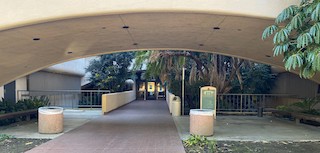Our client, age 28 in 1996, was addicted to cocaine. He really enjoyed the inexpensive high that it provided. One day, as he was driving back home from Los Angeles to Lancaster, he got off the northbound 405 on an exit near an area in San Fernando where he had previously bought some cocaine.
He got out of his car and walked up to a man he had never seen before in the area, but who appeared to be strolling around the area, possibly selling cocaine. Our client walked up towards him and spoke a few words in Spanish indicating he was interested in buying some cocaine.
Our client, as soon as he spoke, knew something was wrong about the other man. Our client had a hunch the other man was an undercover cop. So after our client suggested he was looking to buy some cocaine, he quickly said, “No, never mind” and tried to walk away, back to his car. Our client thought something just did not feel right.
Our client’s hunch proved to be correct, as the man indeed was an undercover police officer from the Los Angeles Police Department, who casually followed our client back to his car and then arrested him there.
Our client was arrested for attempted possession of cocaine, Penal Code § 664 / Health & Safety Code § 11350(a), which was a felony in 1996. He had no prior criminal history, so he feared being sent to prison and the effect this would have on his family.
 San Fernando Courthouse
San Fernando Courthouse
Accordingly, at the very first court appearance in the San Fernando Superior Court, the arraignment, he accepted the very first offer when he found out from his public defender that he would be released on three years of formal probation with only an obligation to attend 52 Narcotics Anonymous (NA) classes, perform ten days (80 hours) of community service and pay some minimal court fines through probation. However, he had to enter a plea to a felony for attempted possession of a controlled substance. The public defender gave our client the impression that he needed to accept this offer or else it would not be offered later – and that the offer would get worse – so our client accepted the first offer.
Our client quickly performed the community service and dutifully attend 52 narcotics anonymous meetings. He also was reliable with his probation officer and well-like by him, so much so that after two years of formal probation, the probation officer suggested that the judge terminate probation a year early. The judge did this for our client in 1998.
In 2017, following the passage of Proposition 47 (“Prop 47”), making certain low-level felony theft crimes misdemeanors and other low-level felony drug offenses misdemeanors, our client received a letter from the public defender’s office advising him that his felony attempted possession of cocaine conviction could be lowered to a misdemeanor under Penal Code § 1170.18(f), Prop 47.
Our client happily accepted the public defender’s offer to request this for him and the public defender was indeed successful in having the felony reduced to a misdemeanor. Our client was grateful of this.
However, with the civil unrest in early 2020 caused by Covid-19 and the Black Lives Matter movement, especially the demonstrations and rioting after the George Floyd, Ahmaud Armery and Breonna Taylor, our client applied to buy a firearm. He was denied. The Department of Justice advised him that he had a lifetime ban on owning, purchasing or possessing a firearm and ammunition.
The client was angry and felt misled by the public defender’s office. He called Greg Hill & Associates and asked if there was anything he could do. He discussed the facts of his case with Greg Hill and Greg explained that he could file a motion for resentencing nun pro tunc under Penal Code § 17(b)(3), rather than 1170.18(f).
Greg explained that Prop 47 did reduce the client’s felony to a misdemeanor, but it carved out an exception to restoring all rights and specifically preserved the lifetime ban on owning a firearm at 1170.18(g). A reduction of the felony to a misdemeanor under Penal Code § 17(b)(3), however, would restore our client’s full rights, including the right to own, purchase and possess a firearm.
Greg then filed the motion, served it on the San Fernando District Attorney’s office and appeared at the hearing on the motion about four weeks later.
The judge granted the motion, which made our client happy because he often worked late at night in rough neighborhoods and wanted to carry a firearm for person protection. He also wanted to have a firearm at home to protect his wife and two children.
For more information about the issues in this case summary, please click on the following articles:
 San Fernando Courthouse
San Fernando Courthouse